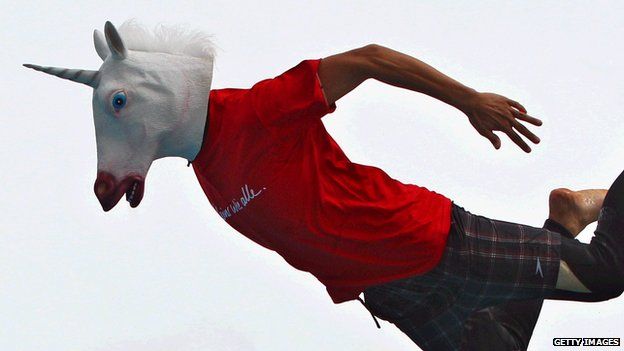

-
16 July 2015
- From the section Technology
- comments

Silicon Valley didn’t happen by accident.
A terrific new exhibition has opened in Washington DC’s National Museum of American History, and in it, a section dedicated to the area on the US west coast which is synonymous with cutting-edge technology.
The display details the trailblazing chip companies blending with hippy counter-culture to make the ideal mix for innovation and entrepreneurship to thrive.
It was this secret sauce – pushed on by military investment and subsidies for companies making technology that helped the US armed forces – that provided the spark for the biggest and most powerful technology hub in the world.
But for how long?
“San Francisco, centre of the universe,” said Satya Nadella, the chief executive of Microsoft, as we sat down to film a BBC interview that will air soon.
“Rome also felt like that one day. Everything has a time.”
He’s perhaps slightly biased – Microsoft is based in Seattle, not San Francisco – but he does share the sentiment of many who wonder if the elements that made Silicon Valley happen no longer exist.
“You should go to Shanghai,” Mr Nadella said, on my first day in the new job. Ah.
Looking out for unicorns
But Silicon Valley has a track record of keeping things going strong. The late nineties dotcom crash hit the companies here hard, but many – like Amazon and Cisco – are still here, surpassing all valuation expectations.
Here, the talk is of “unicorns”, start-ups that are valued at more than $1bn. How this is judged is as mysterious as the unicorn itself – it’s not about profit, just simply how much money others are willing to throw at a company.
Calling these firms unicorns is perhaps pretty apt – their numbers are often complete fantasy, built on excitement and buzz and not much else. But still the money comes, fuelled by a paranoia here of missing the “next Facebook” (although these days they’re more likely to say the “next Snapchat”).
Warnings of another crash have been in the air ever since the last one – but those fears haven’t been realised.
More likely is that Silicon Valley will be a victim of its own success – products created here have given us the ability to communicate and work over long distances better than ever before. Geographical location is becoming somewhat irrelevant.
And so other parts of the world are muscling in, and have been for some time. There’s Berlin, Tel Aviv, and New York, to name a few. London finds itself with an advantage given the proximity of its tech hub, in east London, to the City of London and its bankers. No wonder the British government is putting extra effort into supporting the development of financial technology – Fintech.
And then of course there’s China – a place that is increasingly turning to technology design and innovation rather than simply manufacturing.
But not so fast.
Never a place to be outdone, Silicon Valley is again heading in a new direction. Some of the most exciting, and indeed terrifying, innovations are being worked on here. It’s the testing bed for driverless cars, for new types of trains, for robotics.
It’s a place that is perhaps slowly learning to laugh at itself, shedding some of its image as somewhere that operates in a different reality. HBO’s sitcom, Silicon Valley, has nailed the “it’s funny because it’s true” approach.
Beating heart
Silicon Valley will be in good health as long as good people with good ideas flock here.
“The American sense of hope and enthusiasm is extremely contagious and when you’re beginning your start-up you’re trying to pull off the impossible,” said Robyn Exton, a Brit who took her start-up, Her, to San Francisco in 2015.
I’d met Robyn in 2014 at a London tech event, where she was trying to get her lesbian dating app, then called Dattch, off the ground. Even with London’s efforts in building its start-up scene, it’s a sign of Silicon Valley’s continued power that means people like Robyn will continue to make the move.
This is, if you hadn’t noticed, a rather elaborate way of welcoming you to this blog – a place where I’ll be covering the twists and turns of the technology industry in North America. Based in the beating heart of it all, San Francisco.
For while there are contenders for Silicon Valley’s crown, there’s still no place quite like it.
Follow Dave Lee on Twitter @DaveLeeBBC


